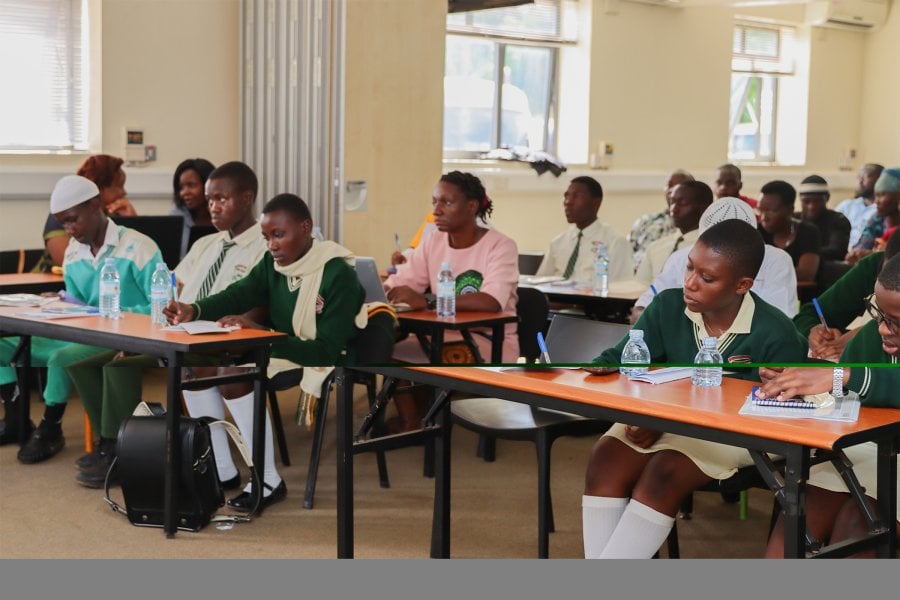
Sleep study jpeg
Entebbe, Uganda,18th February 2025 - A one year intervention study has provided valuable insights into adolescent sleep patterns and suggested that cognitive behavioural therapy for insomnia (CBT-I) may be effective in improving sleep among school-going youth. The study, “Better Sleep, Better Health” was funded by the UK Research and Innovation I Medical Research Council (UKRI/MRC) and is the first in Uganda to implement CBT-I, a globally recommended approach to address the widespread issue of insomnia.
Conducted in two secondary schools in Entebbe, central Uganda, the study worked with 358 day and boarding students in Secondary 2 and 3 to understand the associations of environmental, social and academic factors with sleep. Overall, 10% of students screened positive for moderate or severe insomnia, with 13% of girls being more likely to experience insomnia than 6% of boys. Students in boarding schools tended to have shorter sleep durations at 4.2 hours on school nights compared to the day students who had 6.3 hours at home. Contributing factors included limited awareness of good sleep practices, cultural and religious expectations, academic demands, lack of exercise, and peer influence. Additionally, environmental conditions such as noise, lighting and space, along with societal factors like access to technology and strict school regulations, were identified as key disruptors of sleep.
To address these challenges, students diagnosed with insomnia, many of whom had little prior knowledge of how to improve their sleep, participated in group CBT-I sessions over 5 weeks. The CBT-I was delivered by psychologists, and included guidance on the importance of sleep, managing bedtime worries through journalling, the importance of regular bedtime routines, relaxation techniques, and restructuring unhelpful thoughts. These tools, along with a sleep diary that students completed to track their behaviors, provided students with practical tools to improve their sleep quality.
Participants reported that the sessions were engaging, informative and highly relevant to their needs, with many successfully implementing the recommended strategies to enhance their sleep.
One student shared how the intervention transformed their sleep habits:
"I used to struggle with sleep and had no solution. Attending the sleep education sessions helped me a lot. Now, I go to bed earlier and make an effort to wake up at the same time every day. I sleep at 8 pm and wake up at 5 am."
Beyond improving sleep, the sessions also had a positive impact on students’ emotional well-being. Another student reflected on their experience:
"I also learned how to manage my anger. Before, I was short-tempered and easily irritated, but one of the psychologists in the CBT-I sessions taught me relaxation techniques, like deep breathing and coloring, which have really helped."
Teachers also noted significant improvements, particularly in school-wide structural changes that supported better sleep for students.
"What I liked most were the structural changes. Everyone, students, parents, and teachers, is happy about them. The students are now getting better sleep," one teacher observed.
Another teacher emphasized the importance of their role in ensuring sustainable change:
"For me, it was a privilege. As teachers, we work directly with these students, and the sessions gave us valuable insights. It made us realize that we need to put more measures in place to support students in getting quality sleep."
These findings highlight the need for integrating evidence-based sleep interventions into Ugandan school policies to support students’ overall wellbeing and academic performance. The study’s insights are expected to contribute to shaping policies that influence the establishment of healthier learning environments across Uganda.
The study is part of the Unit’s Non-Communicable Diseases (NCDs) theme. Learn more about NCD research at the Unit
About key scientists:
Prof Helen Weiss (Principal Investigator) is an epidemiologist and medical statistician. Her research focuses on adolescent health, mental health, menstrual health and HIV epidemiology in low-income settings and she is Director of the MRC International Statistics and Epidemiology Partnership | LSHTM.
Dr. Nambusi Kyegombe (Co–Investigator) is an interdisciplinary social scientist and jointly appointed as an Associate Professor in the social science of global and adolescent health and as head of social science at the MRC/UVRI & LSHTM Uganda Research Unit in Entebbe, Uganda where she leads a team of 60 inter-disciplinary social scientists.
Denis Ndekezi (Co–Investigator) is a public health specialist and a Behavioral scientist at MRC/UVRI & LSHTM. His research efforts focus on health promotion, process evaluation of complex interventions and mixed methods research.
About the Collaborating Institutions:
The Medical Research Council/Uganda Virus Institute/ London School of Hygiene & Tropical Medicine Uganda Research Unit (MRC/UVRI & LSHTM) is an internationally recognized center of excellence for research and training. Its mission is to conduct high-quality research that adds knowledge and leads to improved control of infectious and non-communicable diseases in Uganda, Africa and globally, through translation of scientific findings into policy and practice, and rigorous research capacity building.
Reach a Hand Uganda is a youth centered organisation focusing on youth empowerment programs with emphasis on Livelihoods & Skills Development, Behavior Change Communication, Sexual Reproductive Health & Rights, and HIV/AIDS awareness and prevention
Contact: press@mrcuganda.org for enquiries about the study and interviews with the study leads.
If you enjoyed this article and would like to build a career in global health, we offer a range of MSc programmes covering health and data, infectious and tropical diseases, population health, and public health and policy.
Available on campus or online, including flexible study that works around your work and home life, be part of a global community at the UK's no.1 public health university.
